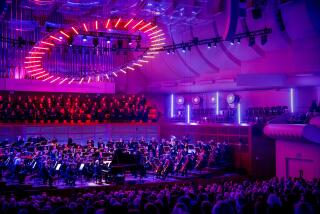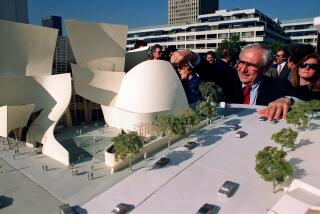Review: Zubin Mehta re-creates a night 50 years ago
Zubin Mehta was not in exactly unfamiliar circumstances, either standing in front of the Los Angeles Philharmonic on Thursday night or in receiving honors. He first faced this orchestra more than half a century ago as a 24-year-old guest conductor. The Walt Disney Concert Hall program celebrated the 50th anniversary of his first program, on Nov. 15, 1962, as music director of the L.A. Phil, which he headed for 16 seasons.
Before the concert began, Los Angeles County Supervisor Zev Yaroslavsky handed the conductor a proclamation designating Dec. 13 Zubin Mehta Day in Los Angeles County (or at least for the four hours left in the day, Yaroslavsky deadpanned). Then Councilman Tom LaBonge friskily handed Mehta a second proclamation naming him a Los Angeles Living Cultural Treasure, one of only five artists to ever be so esteemed.
These can be added to Mehta’s shelf along with the Presidential Medal of Distinction that Israeli President Shimon Peres solemnly hung around the conductor’s neck in Tel Aviv in October. Three months earlier in New Delhi, Germany’s ambassador to India had hung the German government’s Commander’s Cross of the Order of Merit around Mehta’s neck.
After receiving his L.A. accolades, Mehta turned to the audience and quipped, “This concert better be good.” It was.
Mehta also said that he had to be grateful for this city accepting him when he had no background, so to speak. That helps explain that first program as L.A. Phil music director, which was obviously designed to show his earnestness.
If it looks a little unimaginative now — and certainly far less flashy than would reflect the reputation he was soon to attain in L.A. — a lot has changed in 50 years. There had been no soloist. The evening began with Mozart’s overture to his opera “Don Giovanni.” The big orchestral pieces were Paul Hindemith’s Symphony based on his opera “Mathis der Maler” and, after intermission, Dvorák’s Symphony No. 7.
Half a century ago, these two later scores were not, in fact, standard repertory, as they are now. The Hindemith was from 1934, making it roughly as old in 1962 as John Adams’ still contemporary “Harmonielehre” is today. The Dvorák symphony was also, at the time, neglected. The original 1962 season announcement had boasted that it would be the orchestra’s first performance of the symphony until someone realized a young Italian conductor, Arturo Basile, had performed it three years earlier, but under the old numbering as Dvorák’s Symphony No. 2.
In his review in The Times of Mehta’s big night in downtown’s long gone Philharmonic Auditorium at 5th and Olive streets, music critic Albert Goldberg wrote of Mehta’s crisp Mozart and feeling for color and climax in Hindemith. In the Dvorák, Goldberg was surprised by such geniality from one so young. He called the evening serious but not dull.
In some ways that review described Thursday’s concert more than it does the Mehta and L.A. Phil I grew up listening to. Mehta still can get the orchestra to produce the crispest of attacks and the brightest of colors, but they no longer sound gaudy. The evening was serious, not dull and, most important, not superficial.
Just as he had 50 years ago, Mehta made a program change, but not quite so major a one. The original opening night’s first half was to have been a Haydn symphony and Schoenberg’s Five Pieces for Orchestra. The change for this week’s concert was to play Busoni’s rarely heard concert version of “Don Giovanni,” which adds music from the end of the opera and also uses trombones.
In both the overture and the Hindemith, Mehta was no-nonsense. He shaped with care. He brought out individual lines as if they were an etched abstract drawing. Both scores come from opera, the field in which Mehta devotes much of his time these days, but he let the intensity of Mozart and mysticism in Hindemith speak for themselves.
The Dvorák moved along. Mehta offered the occasional surprise, such as bringing out the horns at the beginning or giving unusual rhythmic emphases in the Scherzo. He might have been genial, but he didn’t linger. And that is just how the L.A. Phil responded. The orchestral sound revealed a burnished luster. String articulation was firm. The bass section (the bass was Mehta’s instrument) felt bolted to the stage. The brass were golden. The winds smooth. Just as last week, when the orchestra had remembered its gleaming old self under another former music director, Esa-Pekka Salonen, it now just as naturally returned to an earlier, Mehta era.
Still, for a concert all about him, it wasn’t all that much about Mehta but the music. Perhaps it was because of the program, but there was, if anything, just a hint too much of reserve. A special occasion needed something special. That came at the end. After the final ovation, Mehta returned to say that he could not let the night pass without acknowledging the Tuesday passing of Ravi Shankar, whom he called “my great friend, guru and mentor.”
Perhaps “Nimrod” from Elgar’s Edwardian “Enigma Variations” was a peculiar way for one great Indian musician to pay tribute to another. But this unforgettably, heartbreakingly beautiful performance crossed all boundaries — cultural, musical and emotional.
--------------------------------------------------------
Zubin Mehta with the L.A. Phil
Where: Walt Disney Concert Hall, downtown L.A.
When: 8 p.m. Saturday and 2 p.m. Sunday
Tickets: $20 to $195
Info: (323) 850-2000 or https://www.laphil.org
MORE
INTERACTIVE: Christopher Hawthorne’s On the Boulevards
TIMELINE: John Cage’s Los Angeles
PHOTOS: Arts and culture in pictures
More to Read
The biggest entertainment stories
Get our big stories about Hollywood, film, television, music, arts, culture and more right in your inbox as soon as they publish.
You may occasionally receive promotional content from the Los Angeles Times.







